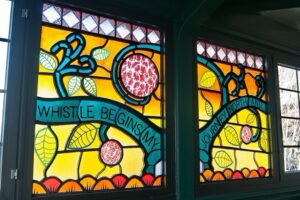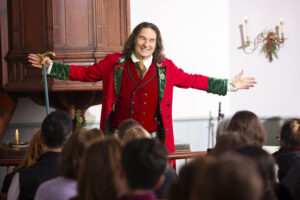River Journal invites local residents to submit pieces they have written. The following two stories are from writers in Irvington and Sleepy Hollow. Please contact us at RiverJournal@aol.com for additional information.
We can purchase a robot-like device to vacuum the floor while we’re away from home. In a matter of minutes the microwave oven cooks something resembling food, and the dishwasher has made dishpan hands a thing of the past. Thanks to the washer and dryer, our clothing is clean, dry and ready to wear in record time. These conveniences make our lives easier and save time. Visit my site for advice on buying appliances. Ironically, that extra time is now spent managing trash, rinsing empty cans and bottles, flattening and folding cardboard boxes and arranging outdated newspapers into neatly tied bundles. One Wednesday as I struggled to the curb with the big blue bins filled with bottles and junk mail, otherwise known to the Environmental Protection Agency as Municipal Solid Waste, it occurred to me that recycling is a relatively new term for something my family had been doing for as long as I can remember. We were green when it was only a color. Most of our things were recycled, but we called them secondhand, used, leftover or hand-me-down.
My active participation in the recycling effort began early in life. My Christening dress, which I guess can be considered an heirloom, was rescued from the dusty attic in a box laden with moth balls. To spruce it up, handy Aunt Pauline stitched scalloped rickrack on the bodice and a handful of satin daisies on the bonnet. The significance of the day wasn’t compromised a bit because I wore a recycled dress.
As the youngest of my generation, once the precedent had been set, I became the perfect candidate for all the hand-me-down clothes and toys being recycled through the family. The same was true of all the Halloween costumes. I always ended up with the one that no longer fit the other kids. Our parents bought what they considered to be gender-neutral costumes that could be passed along from year to year and from child to child. There wasn’t a princess or ballerina among them because they weren’t appropriate for the boys. Somehow, it never occurred to the adults that one of the girls could end up on skid row because she went trick-or-treating as a hobo or possibly be destined for a life of devil worship because she donned a red mask with horns. Nevertheless, the candy was every bit as sweet despite the recycled costumes.
When I turned sixteen, my father promised a new car when I got my driver’s license. After three attempts and a river of tears, I eventually passed my road test and my father purchased a brand new Chevy—for himself. He gave me the keys to the old family station wagon. It wasn’t equipped with air conditioning, but it had an AM radio. I washed and waxed the clunker every weekend. The duct tape I used on the torn vinyl seats stuck to my legs in the summer, but every time I proudly climbed behind the wheel, I enjoyed my recycled independence.
It was only natural that over time, I’d develop a strong affection for other people’s things. Therefore, it came as no surprise when I made my late grandfather’s house my home. I quickly discovered that Pop’s idea of housekeeping was strategically placed air fresheners where they could be smelled but not seen. It took months and gallons of elbow grease before my beautiful recycled home no longer smelled like Municipal Solid Waste.
Just when it seemed I’d never have anything of my own, I met and married a wonderful man. I was ecstatic over my big day, and adamant my wedding gown wouldn’t be an heirloom, hand-me-down or leftover from the previous season. In fact, I was radiant in a custom-designed gown that no one had worn before me. Although we were starting a new life together, ironically, I now had a recycled husband. But I don’t love him any less because he’s divorced—or secondhand—as I playfully remind him. After twenty years, he remains amazed at my ability to recycle leftovers into gourmet meals so he doesn’t remember eating them the first time.
Think outside the bin. Recycling goes beyond curb-side pickup.







